#Life
Studying Islam Overseas: Nadwatul ‘Ulama in India | The Motherland – Prelude
Published
By
Nihal Khan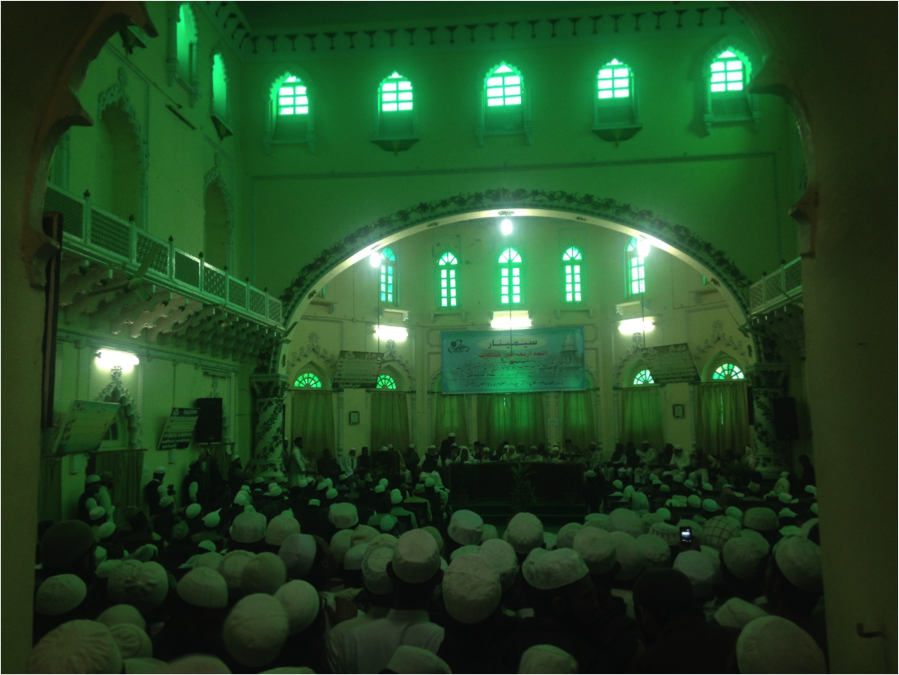
(Updated)
Prelude | Part I | Part II | Part III | Part IV | Part V | Part VI | Part VII
This post is a prelude to the “The Motherland” series which will go over the benefits and challenges of studying Islam overseas in India, institutions of learning there in, and Nihal Khan’s journey of studying at Nadwatul ‘Ulama in the 2014-2015 academic calendar year. The subsequent articles in this series will detail his experiences and reflections from his travels and studies in India.
Keep supporting MuslimMatters for the sake of Allah
Alhamdulillah, we're at over 850 supporters. Help us get to 900 supporters this month. All it takes is a small gift from a reader like you to keep us going, for just $2 / month.
The Prophet (SAW) has taught us the best of deeds are those that done consistently, even if they are small. Click here to support MuslimMatters with a monthly donation of $2 per month. Set it and collect blessings from Allah (swt) for the khayr you're supporting without thinking about it.
. . .
Between the Traditional Study of Islam and Academia
Though I was initially planning on pursuing law school as a career path, but I can happily say I found my niche in the academic study of religion, more so of Islam. I consciously decided to pursue Islamic studies at a full-fledged level in my last year of undergrad at Montclair State University. Though generally the eastern and western traditions of studying Islam have been at odds with each other ever since the days of British colonization, I found that in today’s day and age there is a dire need to synthesize both of these philosophies to an extent in which they become workable realities.
In summary, the eastern study of Islam is focused on classical textual understanding in which the soul of Islam is understood and envisioned as absolute truth—commonly taught in madrasas and Islamic universities in the Muslim world. The western study of Islam is focused on orientalist analyses of the religion, anthropological, historical, and sociological factors that affected the adherence of Islam in those frames. This form of study is common in western universities that teach religion in a deconstructionalist form while ignoring the matter of absolute truth.
I had already been looking at Nadwatul ‘Ulama prior to pursuing Islamic studies as a research career. I was seeking spiritual gratification through the traditional Islamic sciences. After being accepted into the Hartford Seminary’s Master’s in Islamic Studies program, I decided to make this a full-time endeavor.
But why Nadwatul ‘Ulama?
Nadwatul ‘Ulama: Why Did I Chose to Study Here?
Firstly, being an overseas citizen of India (OCI) and possessing a lifetime visa to the country had made my task of studying 75% easier. The biggest issue students of the sacred Islamic sciences face with studying overseas is constantly getting a visa renewed. Though the Hartford Seminary had accepted me and allowed me to pursue extracurricular research, they were not funding my trip nor had I asked them to do so. With the OCI, I did not need to do specific field research where the contingency of my visa’s validity was dependent upon a university, nor was I really eligible to spend a large chunk of time in any other country due to the visa issue. With the OCI, I can enter and exit India as I please.
Secondly, Nadwatul ‘Ulama seemed like the easiest institution to be admitted into for a foreigner while not having to worry about an unstable political climate and tough admission guidelines. Madinah University, Umm al-Qura, Imam Muhammad, Qaseem, and the other Saudi universities are not bad places to study as a student who has an idea of Islamic thought, but admissions take a year (sometimes even more) and there is no guarantee that I would get in. Madinah also has a strong population of American students, hence that is a huge plus to keep you socially engaged (though Nadwa is lacking in this regard and can significantly negatively affect someone, I came here knowing this). Sadly Yemen, Syria, and Egypt have all fallen into a great amount of political turmoil in recent years which deterred/prevented me from studying over there, so Dar al-Mustafa, Al-Azhar, and Abu Noor were all out of the question.
The Rumi Darwaza: An entry gate into Old Lucknow built by the Mughal dynasty.
Due to my Indian ethnicity and the post-2008 politics between India and Pakistan due to the Mumbai bombings, Darul Uloom Karachi, Binoria Town, Ashrafiyyah, the International Islamic University of Islamabad, and all the other Pakistani institutions became very limited choices for me. The only places left were maybe some universities in Jordan or Qasid Institute, the International Islamic University of Malaysia, the European Institute of Islamic Sciences in France, or Darul Ulooms in England or the United States. I did not look at universities in Jordan much, Qasid seemed to be mainly focused on Arabic and did not have a complete Islamic studies program (someone can correct me if I am wrong here), Malaysia was not on my radar since I did not know anyone from there at the time, I got word from people that the EIIS in France was not at its peak that it was known for, and because I am a former student of the madrasa system within America, I wanted to get a different experience of studying Islam outside of that environment (England is included here).
There were also some institutions in the gulf countries such as Qatar and Kuwait, but I was not too interested as the curricula were not my cup of tea for what I needed. Not to mention I wanted a feel of what it was like to live outside of the United States–which I would not have achieved by living in a gulf country that looks, feels, and operates very much like America. But some places like the Qatar Institute of Islamic Sciences seemed to show a very nice advanced curriculum with famed Muslim philosophers as visiting professors such as Dr. Tariq Ramadan and Dr. Jasser Auda.
Thirdly, Nadwatul ‘Ulama has quite a jubilant history within the subcontinent in the areas of unity within the Muslim community, academia, comparative studies, all while rooted in the traditional textual understanding of Islam. In the late 1800s, some forty to fifty years after the great mutiny where thousands of Indians–regardless of religion, were massacred at the hands of British imperialists, Muslims were figuring out what direction they wanted to take their educational institutions. In a nutshell, India’s largest and most influential Muslim thinkers at the time—who would later found the erudite institutions known as Aligarh Muslim University (AMU) and Darul Uloom Deoband, presented two approaches to preserving Islam which each side disagreed with. The AMU approach was more concerned about teaching the secular sciences within a Muslim shell (I will be writing more about AMU in a future MM article), while Deoband’s (also in an upcoming article) was entrenched in understanding, teaching, and preaching the textual tradition of Islam.
The tomb of Nawab Saadat Ali Khan, a former ruler of Awadh. A not-so-common tourist attraction with a beautiful view in Lucknow.
In the midst of these two schools, a conference of scholars representing each approach (and from outside these two groups) formed a think tank of sorts called the Nadwatul ‘Ulama (the conference of scholars). They had a conference which eventually blossomed into the institution which we have today in Lucknow. The premise was to be open and inviting to Muslims of all backgrounds, schools of thought, associations–be it Deobandi, Ahle Hadith (Salafi), Sufi, Hanafi, Shafi, Hanbali, political activists (which would lead to the later formation of the Jamaat-e-Islami), and others–as well as recognize the academic needs of the time and provide solutions for them. This sense of unity and functionality within the subcontinent really struck me in a positive light, as this institution preserved the Muslim community at a time of great strife and turmoil while not limiting their intellectual abilities of growth. I have studied in various traditions throughout my short life and learned to be critical of whatever religiously-political reactionary establishment of Islam that I had taken from. Hence, Nadwa just seemed like the right fit for me. I felt these similar values are what American Muslims are in need of, hence after visiting in 2014, I applied and got into Nadwatul ‘Ulama.
Academics
There are various streams at Nadwa to study from according to the student’s liking. All of these streams fall under the traditional Dars al-Nizami curriculum with some tweaks from the institution. Though foreign students are usually not turned away, officially you need to have a valid visa to stay in India to be given admission, A student should be able to converse either in Urdu or Arabic (you can learn either during your stay) so that you are not placed in the first year of the program. (Though my personal recommendation, it is better to get a good grounding in your basics back home before coming to large institutions where you are not given individual attention due to the large volume of students). Though a “section” is the English rendering, the following are all technically traditional ‘alimiyyah programs with respect to the curriculum. Here is the break down:
The ‘Aaliyah Section (BA Equivalent)
This section is four years long and is Nadwa’s main stream. Many students that study here usually come from another madrasa branch of Nadwa in India, have studied before the beginning of the first year of this program, and are given the most attention from the BA equivalent streams. The strong points of this section and the khusoosi are Arabic, Fiqh, and Hadith. This section is taught fully in Urdu
The Khusoosi Section (BA Equivalent)
Though similar to the ‘aaliyah section, the khusoosi is mainly for students that are coming from a high school (10+2) or BA program. Basically, the students here have not studied in a madrasa for a majority of their lives (do not forget that India has very clean-cut delineations for students studying specific majors. What you study is what you will be working in for the rest of your life). I have a lot of respect for many students in this section as they went from studying commerce, finance, or engineering to Islamic studies. This section also has a large amount of students who may be in between certain milestones in their life, so many may not stick around for next year. Some are studying in this program because they failed other majors in college and are trying to establish themselves in a completely different field. Students spend three years here and then automatically transfer into the ‘aaliyah section in the last two years. This section is also taught fully in Urdu.
The Arabic Section (BA Equivalent)
This section mainly caters to foreigners who do not have a stronghold in Urdu. All subjects mirror the khusoosi section, except that all classes are taught in Arabic, Shafi’i fiqh is learned by the students instead of Hanafi fiqh, and there is much more emphasis on Hadith over Fiqh. I initially took admission here but transferred into the Urdu section later as I felt the studies were stronger in terms of academic rigor in the latter. At the same time the students in the Urdu section were much more inclined towards in-depth study as their environments and teachers sought to do that much better.
A view of the Nadwa Masjid from the Athar hostel.
Do not think you will not learn Arabic in the other sections, rather I have seen better Arabic speakers come from the Urdu section compared to the Arabic section. As mentioned before, the only plus advantage is that all classes are taught in the Arabic language.
For those wondering, there is no dedicated one year for dawrah al-hadith (a complete reading of all six books of hadith) at Nadwatul ‘Ulama in the BA Equivalent (‘alimiyyah) sections. Though you begin studying the six books of hadith, Nadwa wants you to finish the Fadeelah program if you would like to finish Bukhari and Muslim, the two main canonical works of Prophetic traditions in Sunni Islam.
The Fadeelah Section (MA Equivalent/Takhassus/Specialization)
This is probably the crux of Nadwa’s academic offerings. After completing one of the above sections and having a grasp in Urdu and Arabic, students are given the choice of specializing in a science —Prophetic traditions (hadith), Quranic exegesis (tafsir), Islamic law (fiqh), Islamic evangelism (da’wah), completing the remaining portions of the collections of Bukhari and Muslim, and learning to research texts, write articles, and the like. This is a two year program and comes highly recommended by many people such as Shaykh Akram Nadwi of the United Kingdom.
Nadwa definitely has the environment needed for a student of Islamic sciences to progress in whatever they are studying. These are the base programs. Students are expected to read books outside of class, engage in short research projects, as that is the actual point of coming to Nadwa in the view of all the teachers. Though it takes time to break in to the culture, food, and people, once you get into the swing of things you will be able to drink from the wells of knowledge therein. My own personal out-of-class educational endeavors took me to Mazahir al-Uloom in Saharanpur where I sat with Shaykh Yunus Jaunpuri (India’s most senior scholar of hadith) for two days, Darul Uloom Deoband, and various madrasas in Gujarat. Just to show how big of a deal Shaykh Yunus is, Shaykh Akram Nadwi is also currently in the midst of authoring a book on him and his accomplishments in the sciences of hadith.
This series will be continued every week and will cover the various experiences and lessons I learned throughout this endevour to study Islam in India. I hope to convey to readers how life is in India for an American through speaking about my interactions with health care, law enforcement, locals, Islamic institutions, what students of knowledge should consider before thinking about studying overseas, and lastly reflections and recommendations on the institutions and places I have and will continue to visit within India.
. . .
Check out Part I of this series: Experiences of Islam, Politics and Culture in India.
Keep supporting MuslimMatters for the sake of Allah
Alhamdulillah, we're at over 850 supporters. Help us get to 900 supporters this month. All it takes is a small gift from a reader like you to keep us going, for just $2 / month.
The Prophet (SAW) has taught us the best of deeds are those that done consistently, even if they are small. Click here to support MuslimMatters with a monthly donation of $2 per month. Set it and collect blessings from Allah (swt) for the khayr you're supporting without thinking about it.
Nihal Khan is an Imam, chaplain, and academic currently pursuing a PhD in Islamic Studies in the Department of Near Eastern Languages and Cultures at UCLA. As the founder of Maktab Academy and the “Faith in Fine Print” podcast, Nihal has studied the Islamic sciences across America, Egypt, India, and Turkey. Born in New Jersey, Nihal memorized the Qur’an at Dār al-ʿUlūm New York and Ṣaut al-Furqān Academy. He earned a BA in Psychology from Montclair State University, an ʿālimiyya degree from Nadwatul ʿUlamā in India, and an MA in Religious Studies from Hartford Seminary. While in Istanbul, he studied at Ma'had Dār al-Funūn and Ibn Haldun University. Having served as an Imam and chaplain between mosques, hospitals, and jails throughout America, Nihal strives to combine his scholarship with pastoral care and community building. Fluent in Arabic, Urdu, and Turkish, Nihal currently lives in Los Angeles with his wife.


An Iqbalian Critique Of Muslim Politics Of Power: What Allamah Muhammad Iqbal’s Writings Teach Us About Political Change

Muslim Book Awards 2025: Finalists

Far Away [Part 3] – Wounded

Darul Qasim College Given License To Grant Master’s Degrees

MM Wrapped – Our Readers’ Choice Most Popular Articles From 2025

Restoring Balance In An Individualized Society: The Islamic Perspective on Parent-Child Relationships

Ahmed Al-Ahmed And The Meaning Of Courage

AI And The Dajjal Consciousness: Why We Need To Value Authentic Islamic Knowledge In An Age Of Convincing Deception

Moonshot [Part 32] – FINAL CHAPTER: A Man On A Mission

Far Away [Part 1] – Five Animals

[Dhul Hijjah Series] Calling Upon the Divine: The Art of Du’a (Part 1)

IOK Ramadan 2025: Four Steps | Sh Zaid Khan

IOK Ramadan 2025: Do Your Best | Sh Zaid Khan

IOK Ramadan 2025: Giving Preference to Others | Sh Zaid Khan

IOK Ramadan 2025: Which Group Are We In? | Sh Zaid Khan
Trending
-
#Life1 month ago
Op-Ed – When Islamophobes Try To Intimidate Us, They Underestimate Our Resolve: A Call to Stand With America’s Muslim Students
-
#Current Affairs1 month ago
Who’s Afraid Of Dr. Naledi Pandor? – Zionist Panic and a Visa Revoked
-
#Life1 month ago
Owning Our Stories: The Importance Of Latino Muslim Narratives
-
#Islam2 weeks ago
Restoring Balance In An Individualized Society: The Islamic Perspective on Parent-Child Relationships
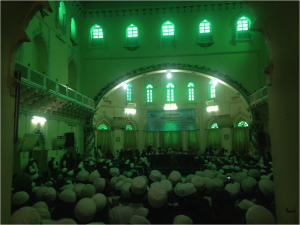
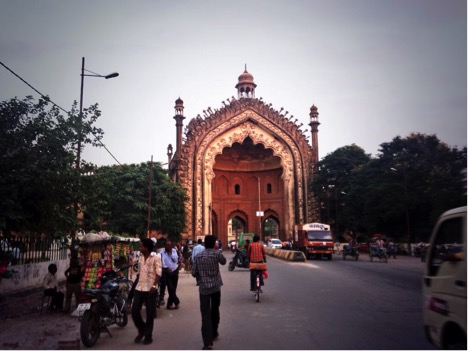
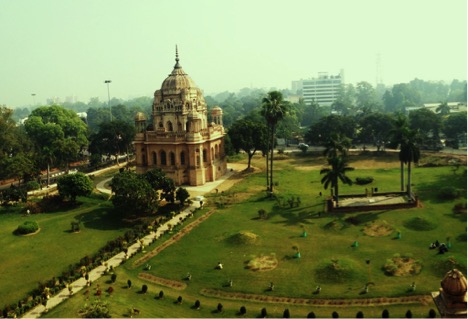
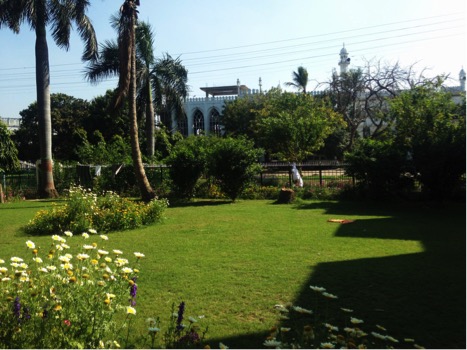


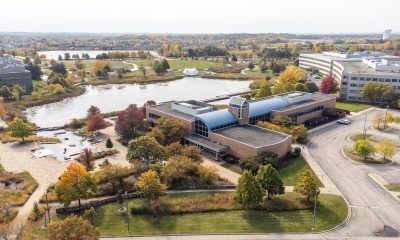







hafsa
August 26, 2015 at 8:39 AM
Salam alaykum brother. Great article! For women who have less opportunities to study in a traditional Islamic Institution like this one, I found Islamic Online University to be a very good forum though you miss out on the tarbiyya and training you receive as a part of studying on campus.
Faisal
August 26, 2015 at 8:06 PM
Please check out the video titled from Nadwatul Ulam to Cambridge Islamic College by Dr Mohammad Akram Nadwi. Cambridge Islamic College is for both men and women.
https://www.youtube.com/watch?v=swNAWtAtUE8
Zara
August 26, 2015 at 2:28 PM
Jazakallah khair for this, it’s a fascinating read.
Do you have suggestions for women who wish to study Islam formally to such an extent but aren’t able to do so at traditional institutions?
Faisal
August 26, 2015 at 8:26 PM
Yes you can consider Cambridge Islamic College [www.cambridgeislamiccollege.org]
Nihal Khan
September 16, 2015 at 2:26 PM
Ws Zara,
Though I’m currently in the middle of publishing the rest of my experience through a series of posts on MM, it’s important to remember a few points which I personally recommend:
1. Consider heading overseas ONLY after you’ve exhausted the study of basic subjects. Larger institutions are not able to individually cater to each student as much as a personal teacher or smaller classrooms are able to do. Before even considering it, one ought to have studied Nahw, sarf, basic tafsir, usool al din, basic fiqh, usool, etc before. And if you think opportunity is limited in America for women to study Islam, then overseas will only be worse. You need to pinpoint local resources and juice them to the best of your ability in helping you study.
2. There are institutions where women can study overseas in many places–it just won’t be like a western college classroom with comfy tables, chairs, air conditioning, etc. It will require struggle. Many times western students think that the first class educations experience we get back home are what we should expect when we go overseas. It would prepare a student–be it male or female–for them to be ready to sacrifice the comforts which they are extremely accustomed to in the pursuit of knowledge. Don’t put yourself through hardship on purpose, instead–be ready to endure it when you are tested with it.
Faisal
August 26, 2015 at 8:07 PM
Please check out the video titled from Nadwatul Ulama to Cambridge Islamic College by Dr Mohammad Akram Nadwi. Cambridge Islamic College is for both men and women.
https://www.youtube.com/watch?v=swNAWtAtUE8
Bakhtawar
August 26, 2015 at 11:01 PM
Jazakallah khair for such an article. Maybe this will motivate others to share their experiences studying Islam abroad. I’m looking into studying islamic studies at International Islamic University Islamabad myself, but haven’t been able to find anyone who has graduated from that program.
Nihal Khan
September 16, 2015 at 2:29 PM
Ws Bakhtawar,
Thank you for your kind words! I know a few graduates from the university in Islamabad. If you’re serious about heading there, then feel free to e-mail me at nihalk1 at gmail.
Zuhaib
August 26, 2015 at 11:14 PM
In the US.
Darul Qasim in Chicago IL offers a comprehensive curriculum.
DarulQasim.org
Nihal Khan
September 16, 2015 at 2:30 PM
Salam Zuhaib,
Yes! Darul Qasim is a great place to consider within the United States. It’s a privilege to sit and benefit from Shaykh Amin Kholwadia.
dr ikram
August 27, 2015 at 4:22 AM
Jazakallah khair for such a good article.did you have any prior islamic education which helped you in gaining admission in nadwa.im a doctor by profession and i dont know arabic or urdu.though i can read simple urdu i cannot write it.how to go about gaining admission in places like nadwa.i have a keen desire to learn islam from a place like nadwa.currently im pursuing a diploma from iou.
Abu Milk Sheikh
August 27, 2015 at 10:03 AM
Are there any foreign family-men in the program? I.e. Men who have brought their families and are attending Nadwa. If so, how do they manage?
Nihal Khan
September 16, 2015 at 2:36 PM
Nope, none that I know of.
Ed
September 14, 2015 at 9:38 AM
Studying abroad has its advantages in that you can be among Muslims that live with Sharia law. You don’t have people giving you a degrading look because you wear a Burka or Headscarf. You study among Muslims. On the other hand you are subjected to a lower class status as a human being because women are not see as equals to men. Sharia law rules to whatever the Ayatollah says.
The advantage of studying in the west is that you have exposure to better schools and a respected education. You are treated as an equal to everyone and don’t have to wear any restrictive clothing. You can be like a man, drive a car like a man and participate in just about any activity you are capable of performing, just like a man. Such freedom allows for the full expression of yourself as a human being. There is no fear of men or their backward social (sharia) views. Women are encouraged to be equals in western society and frowned upon when they choose a lesser role for themselves. That is why there is no Taylor Swift, celebrity in Muslim society. Its your life, you came into this world alone and you will leave it alone. You choose for yourself.
Pingback: » The Motherland: Experiences of Islam, Politics, and Culture In India
Faraz
September 15, 2015 at 10:47 PM
Good read, my only comment is that it seems like you “settled” for Nadwatul-Ulama when all your preferred choices in KSA, Pakistan, Middle East, etc… were not possible. In practice though, Nadwatul-Ulama is a tremendous institution that should be regarded as among the leading places to study Islam throughout the world, it shouldn’t be considered as the option you consider only when you exhaust all your other options. I’ve only visited the campus on a few occasions, but subhanAllah it was enlightening and peaceful just being there. I find that the graduates I’ve met from there have had a broader world-view than ‘ulema from other institutes, and have particularly adept at translating their studies to a Western context. The graduates do a great job carrying the legacy of Shaykh Abul Hasan Ali Nadwi.
Nihal Khan
September 16, 2015 at 2:46 PM
Salam Faraz,
The main reason I considered the other schools is due to the larger number of American students present at those institutions. You have a support system to rely on in case things go south. I didn’t chose Nadwa because “well, getting in everywhere else is too hard”.
When choosing where to study overseas, I highly recommend students research whether 1) One can easily attain and hold onto a visa wherever they are going to study, 2) See if there are other foreign students of your background with who you can connect with. If not friends, then family.
These are the MOST important things to consider when headed overseas. Honestly, when it comes to studies while you’re a foreigner in another institution, the only really important factor is whether there is a general culture of studying. If so, then you’re fine. After speaking to dozens of students studying overseas at various Islamic institutions, we all concluded that your academic rigor and capabilities are somewhere around 50% dependent on your own ability to study, 25% on the teacher, and 25% on the class lecture. Basically, whether you go to Madinah, Azhar, Nadwa, etc–it doesn’t make too much of a difference at the end of the day if you have good study habits.
But for myself, the visa was the main aspect–not to mention I studied briefly with a Nadwi before coming to India. After analyzing the best place for me in the circumstances I am in, I concluded Nadwa was the best common denominator. That’s how I came here :).
Pingback: » Self-Revelations: Discovering Your Limits in India | The Motherland: Part II
Pingback: » Health Care in India: Scooters, Breaking Bones, and Surgery | The Motherland – Part III
Rahat
October 22, 2015 at 9:49 PM
Really helpful.
sam
November 6, 2015 at 7:42 AM
Salam
If one is able to read traditional texts in Arabic (and has completed the Hidayatun Nahw or Ajrumiyyah)
And has studied basic fiqh aqeedah and usool hadith and tafseer all basic,
What programme could one be admitted into in Islamabad in order to further one’s studies?
Preferably Drs e Nizami
Sued Adnan Murtaza
December 15, 2015 at 2:34 PM
MA SHA ALLAH..Beneficial Article,
It will be helpful for those who wish to study in traiditional institute like this one..
and should be translated in to Arabic language and others one.
Amir Ahmad khan
July 6, 2016 at 7:49 PM
jazakalla kumula hu ahsan al jaza for a great turning and motivating leccture… it is an humble request to all of my brothers and sisters that help your brother… ‘How i can sdmission in the one of the growing and advancing darul uloom nadwa…
asalamh alukum wa rwhmutulahi wa barakata ho
amer
August 23, 2016 at 3:17 AM
I call many time ,nadwatul ulama and deobond univercity,but no answer until now,pease answer me..
Muhammad Ayaz
September 21, 2016 at 12:52 AM
As-salamu alaykum,
I am an engineering drop out from Mumbai and currently seeking a course in Islamic studies. Reading about the Khusoosi course has got me intrigued. Only issue is that I’m 26 years old and might have to at least find a part-time job, would that be feasible?
Mohammad Sarwar
September 16, 2017 at 5:11 AM
As-salaamu ‘Alaykum Wa Rahmatullaahi Wa Barakaatuh!
Brother,
I pray this message finds you good health and Imaan.
Quick question, how did you enroll to Darul Uloom Nadwatul Ulama?
I live in the UK and I would like to apply. I have checked their website but some of their pages are appearing as 404.
Bilal
October 5, 2018 at 9:35 AM
Masha allah brother nice article i am from makkah studied in madrash al sawlatiyah and planning to move nadwa tul ulama but i am very weak in studies please help me